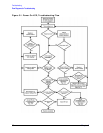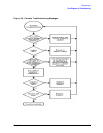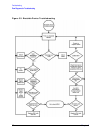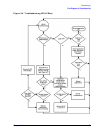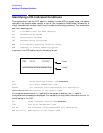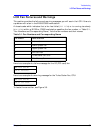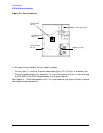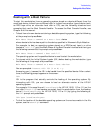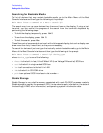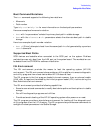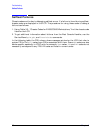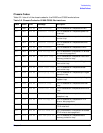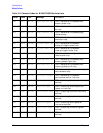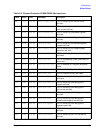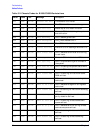
Chapter 3 57
Troubleshooting
Dealing with a Boot Failure
Dealing with a Boot Failure
To start this workstation from an operating system stored on a device different from the
usual boot device, to boot from a different disk, or to boot from another type of device (such
as DDS tape drive, an alternate hard disk or CD), see the following situations and
examples that use the Boot Console Handler. To access the Boot Console Handler, see
Chapter 6 of this manual.
• To boot from a known device containing a bootable operating system, type the following
at the prompt and press
Enter:
Main Menu: Enter a command or a menu > boot device
where device is the hardware path to the device, specified in Mnemonic Style Notation
For example, to boot an operating system stored on a DDS-format tape in a drive
located at “scsi.1.0,” go to the Main Menu of the Boot Console Interface and then type
the following command at the prompt and press
Enter:
Main Menu: Enter a command > boot scsi.1.0
The operating system on the specified device is used to start the workstation.
• To interact with the Initial System Loader (ISL) before booting the workstation, type
the following at the prompt and press
Enter:
Main Menu: Enter a command or a menu > boot <device>
You are prompted: Interact with ISL (Y or N) > y
Answering yes (y) causes the ISL to be loaded from the specified device. After a short
time, the following prompt appears on the screen:
ISL>
ISL is the program that actually controls the loading of the operating system. By
interacting with ISL, you can choose to load an alternate version of the HP-UX
operating system.
For example, if the usual kernel (/stand/vmunix for HP-UX 10.20, 11.0 or 11i) on the
root disk (fwscsi.6.0) has become corrupted, boot the workstation from the backup
kernel (/stand/vmunix.prev for HP-UX 10.20, 11.0 or 11i) by typing the following at
the ISL> prompt and press
Enter:
ISL> hpux /stand/vmunix.prev
• To find the location of the bootable operating systems on the various media in the file
system, use the search ipl command.




